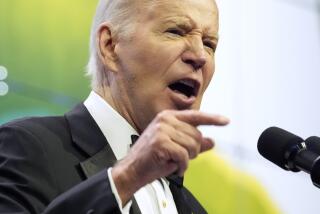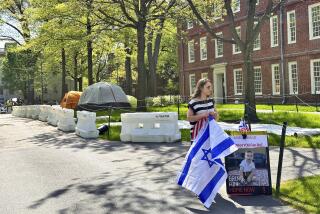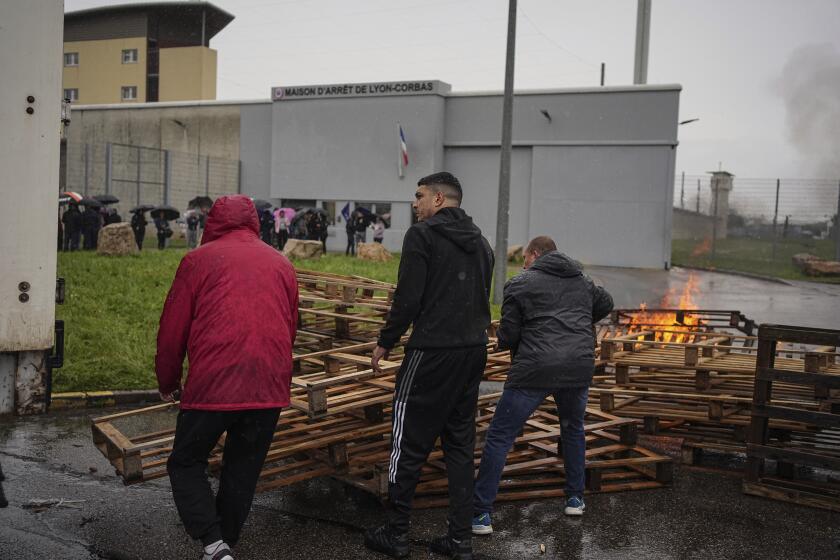A Night of Firsts for Afghans and Their U.S. Party Guests
As three Afghan men swung their arms and swayed to music once banned by the Taliban, wide-eyed Afghans at a religious fete hosted by a regional warlord watched another landmark event unfold.
Among the 400 U.S. and Canadian guests of Kandahar Gov. Gul Agha Shirzai, three female American soldiers rose to mimic the dance, their M-4 rifles bouncing off their swinging hips--this in the conservative birthplace of the Taliban, where many women have yet to doff their head-to-toe burkas. In the back of the cavernous tent, 22-year-old Fazal Amad Karzai broke into a broad grin.
“I have never seen women dance,” Karzai, who said he was a cousin of interim Prime Minister Hamid Karzai, explained in English. “I want to make my sister and my daughter to be free. I want to free my women. This is the happiest day of my life. I am almost crying.”
The coed dance marked just one tradition cast aside for Sunday’s event. The party, held in honor of the Muslim holiday of Eid al-Adha, featured a band brought in from Kabul, the capital, where Taliban strictures against music were less stringently observed than here. Then there was the mingled celebration with “unbelievers,” reviled as infidels by fundamentalists, on a Muslim holy day.
The abandonment of taboos amounted to an open show of gratitude by Shirzai, a shrewd Afghan leader whom some U.S. officials consider a possible future prime minister. U.S. defense officials say it also reflects the hope that Americans won’t abandon Afghanistan.
“One of the things they’re very, very concerned about is: Are we going to stay?” said Ravi Mallikarjunan, an American civilian working in U.S. military intelligence. “Tonight was a way of showing that they would like for us very, very much to stay. What you saw is the village elders coming together to pay their respects.”
Like other Afghan leaders, Shirzai has cultivated an alliance with U.S. military and political officials.
“It’s practically unheard of to invite a Christian,” Mallikarjunan said of the Eid celebration. “It’s an enormous show of faith and affection. It transcends normal religious decorum. He is taking an enormous risk of upsetting his more fundamentalist Islamic folks.”
Shirzai’s government holds regular meetings with a team of U.S. Army civil affairs officers at the governor’s palace. One of them, Maj. Michael Blankenship, who shared a warm greeting with Shirzai at the governor’s party, described the U.S. role as one of offering assistance but not determining outcomes.
“We’re not here to nation-build,” Blankenship said. “We’re here to set the cornerstone for others to build on.”
Shirzai has a reputation for wielding power with more discretion than less subtle Afghan faction leaders, such as the reputedly brutal Northern Alliance general Abdul Rashid Dostum. At least once, Shirzai is said to have persuaded U.S. officials to hand over suspected Al Qaeda and Taliban fighters to his regional army, who reportedly used more aggressive tactics to wrest intelligence from the detainees within days.
To get to Sunday’s party, the American and Canadian soldiers had only to walk a few hundred yards outside the concertina wire of the U.S.-held Kandahar airport to the walled compound of Razik Shirzai, the governor’s brother.
Eid celebrants often don new clothes for the occasion. Razik Shirzai chose the desert camouflage uniform worn by the Americans, adding an Afghan flag stitched over the left breast pocket, and shiny black U.S. Special Forces boots that had seen little contact with the inescapable Kandahar dust. He escorted the base VIPs to a receiving line of southern Afghan dignitaries.
Sitting to the governor’s right were Ahmed Karzai, a local official and brother of the interim prime minister, and Khalid Pushtoon, a spokesman for the provincial government. To his left were Shirzai’s security officials, in white navy-style jackets with gold epaulets. Directly at his side, wearing civilian clothes and a black baseball cap, was the bearded American colonel in charge of Special Forces troops at the base; military officials asked that he not be identified by name.
The close relationship between Afghan leaders and U.S. special operations teams is an open secret, but the details of the cooperation are closely guarded, at least in part out of the Afghans’ concern for the safety of their benefactors.
Yet the significance of the relationship was clear by the seat of honor the colonel was given, along with the presence of several long-haired, unshaven Americans in a mix of civilian and camouflage garb. U.S. leaders expressed concern for the safety of the colonel after he was identified in a U.S. news report this week. One Afghan leader complained that U.S. officials had inappropriately allowed a journalist to attend the celebration.
For the Afghans inside the brightly colored tent, it was the first time in years that they had heard a robab, an Afghan stringed instrument.
Waiters passed out trays of pistachios, walnuts, sweet raisins and almonds to whet the appetites of soldiers accustomed to military rations. The Afghans waited as hundreds of troops crowded the long table to fill their plates with chicken kebabs, oranges and soft drinks.
“We call it AFC: Afghan Fried Chicken,” quipped Col. Keith Bartsch, commander of the Air Force’s 19th Air Support Operations Squadron.
Later, Gulalai Ali strode onto the dance floor, stripped off his shirt and demonstrated his bodybuilder physique, smiling as Shirzai and the crowd applauded. Then, in the wee hours, a U.S. Army officer arrived to discreetly urge the party-goers to return to the base, past the military police who sat in heavily armed vehicles cheerfully munching leftover chicken.
More to Read
Start your day right
Sign up for Essential California for news, features and recommendations from the L.A. Times and beyond in your inbox six days a week.
You may occasionally receive promotional content from the Los Angeles Times.






